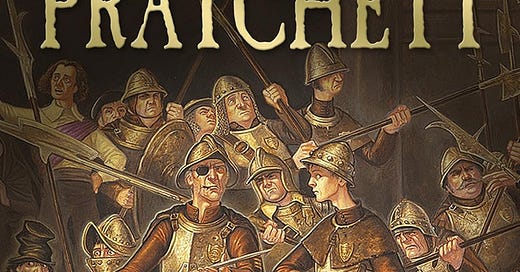The Discworld as an Evolved Creature
My first encounter with Terry Pratchett’s Discworld novels came during my university years. I was a young, enthusiastic fantasy nerd—Tolkien and Michael Moorcock among my favorites—when I stumbled across The Colour of Magic and The Light Fantastic. I enjoyed them immensely: they were funny, zany, and packed with genre-savvy jokes and parodies I could fully appreciate. The wizards were a hilarious caricature of university professors, and the books offered a kind of gleeful chaos I hadn’t encountered before.
What they arguably weren’t, however, was highbrow or serious, and that was fine. I saw them, as I suspect Pratchett did too, as light-hearted entertainment. After all, he once quipped that being knighted for “services to literature” was ironic, since his greatest service had been not writing any. I was also reading my share of ponderous tomes - English philology doesn’t read itself- but there’s a time and a place for everything, and literary palates can be broad.
One thing neither I, nor perhaps even the late and much-missed Pterry, quite expected was that Discworld would evolve into a 40-plus-volume epic spanning three decades. Over that time, the series changed in remarkable ways. For one, Pratchett became a better writer. But more importantly, he began to take his world seriously, or at least half-seriously. The setting solidified: Ankh-Morpork gained a concrete geography, complete with published maps of the Big Wahoonie. Recurring characters grew from running gags into richly developed figures, and the plots became more intricate, the world-building more detailed, and the subject matter increasingly weighty. By the time we reach Night Watch (the 29th book, published in 2002) the transformation is stark, and wholly for the better.
Night Watch: The Plot
Night Watch belongs to the so-called "Watch" novels, which began as parodies of detective and police procedurals set in a fantasy world. Their central cast is the Ankh-Morpork City Watch:
- Commander Sam Vimes, a tough, cynical, justice-driven ex-alcoholic who believes in justice more than law.
- Captain Carrot, perhaps the rightful king, but content to be an honest, impossibly good copper.
- Sergeant Angua, a werewolf constantly at odds with her dual nature.
- Sergeant Fred Colon, the embodiment of the plodding, prejudiced, but loyal old guard.
- Corporal Nobby Nobbs, technically human, possibly a thief, but oddly lovable.
In this installment, the focus narrows on Vimes, who, while pursuing a brutal murderer, is flung backward in time by a freak magical accident. He arrives at a pivotal moment: the eve of a revolution, and the days of his own youth. Trapped in the past, he must impersonate his long-dead mentor, guide his younger self, and prevent the murderer (also transported) from altering history. As the city spirals toward chaos, Vimes becomes enmeshed in the uprising, forced to confront brutal truths about power, justice, and his own identity. It’s a gritty, emotionally resonant story about moral compromise, personal growth, and the making of a man who defines what law ought to mean in a lawless world. And that’s as much as can be said without spoilers.
Discworld Gets Serious
Night Watch is often cited as one of the finest -and most mature- entries in the Discworld canon. Even critics who typically dismiss fantasy have praised its emotional depth, moral complexity, and character development. Compared to the densely comic, satirical tone of earlier books, this one marks a clear shift: the jokes are fewer, the humor darker, and the themes much closer to real-world concerns: state violence, torture, surveillance, revolution, and the murky ethics of policing. It’s not Les Misérables, but it approaches that territory, an homage, perhaps, in the limit as n → ∞.
Pratchett explores these heavy topics through a distinctly British, commonsensical, mildly conservative (in the best sense) lens—one that would make Chesterton or Dr. Johnson nod in approval. There’s real sympathy for the poor and downtrodden, coupled with a healthy skepticism toward both idealistic slogans and the self-serving behavior of the elite. Above all, there's a profound meditation, channeled through Vimes, on the burdens of leadership, the dangers of power, and the stubborn necessity of personal integrity.
Night Watch rises well above the average Discworld novel ("They always rise up / Rise up / Rise up"), though many of those brush serious themes too; at the same time, it remains just as gripping and, in its own way, just as entertaining as ever.




